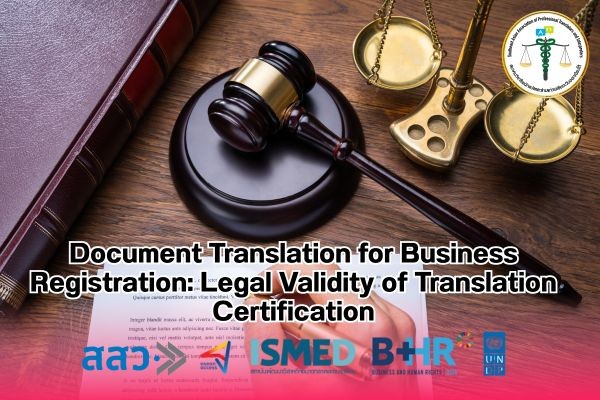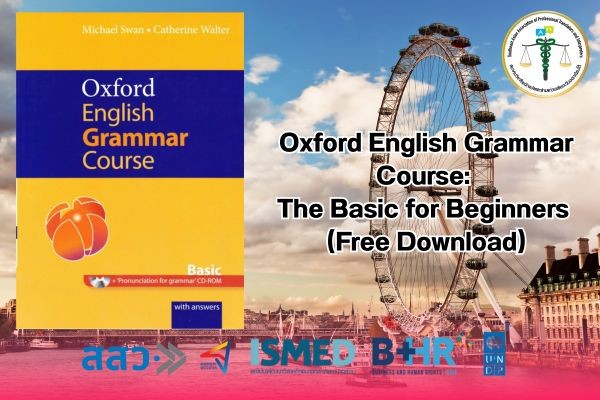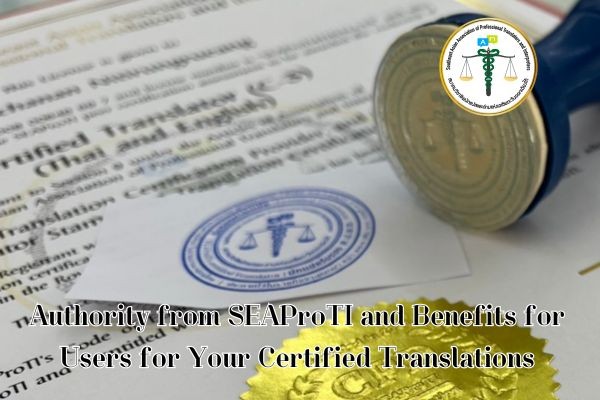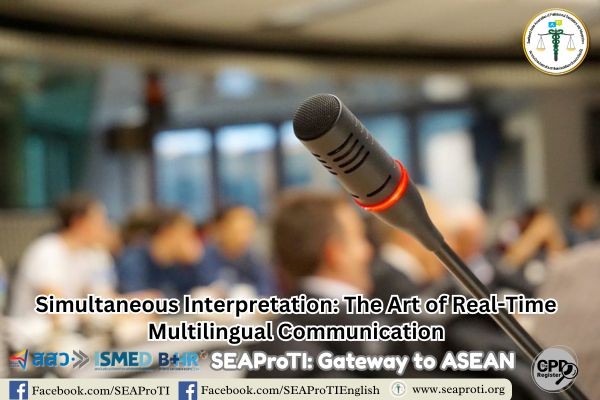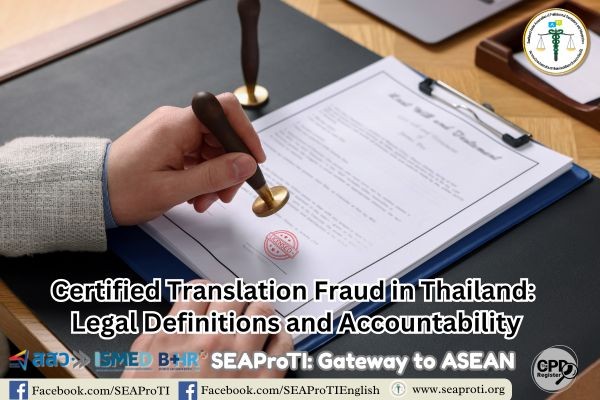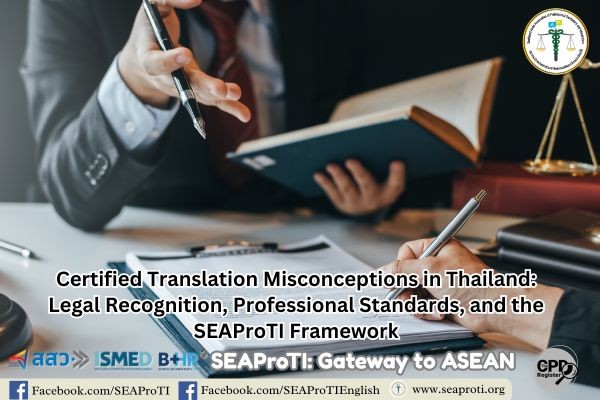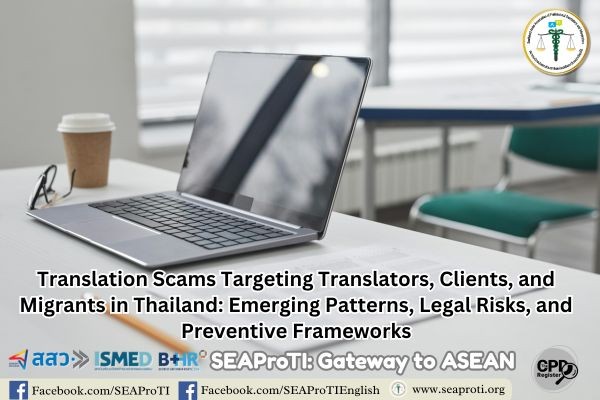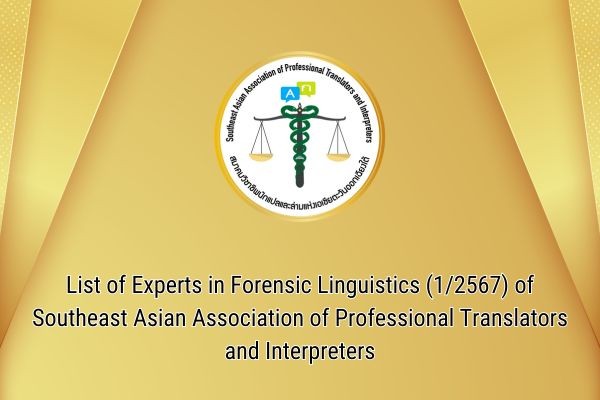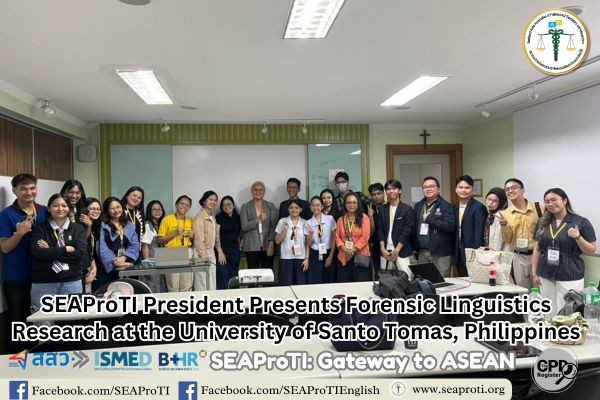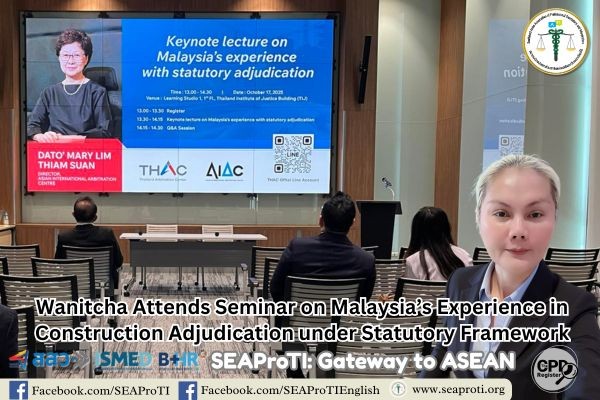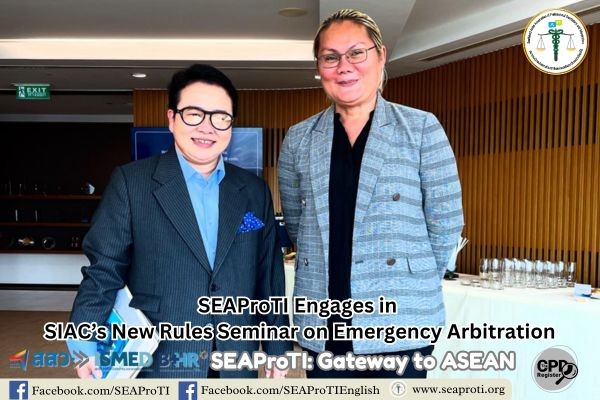Document Translation for Business Registration:
Legal Validity of Translation Certification under the 1997 Ministerial Regulation and Its Implications for Administrative Practice
Abstract
This article examines the legal and practical issues surrounding the translation of foreign-language documents submitted for business registration with Thai government agencies. The focus is on the Ministerial Regulation B.E. 2540 (1997) issued under the Administrative Procedure Act B.E. 2539 (1996), which mandates that translations must be certified by designated individuals or institutions. The article analyzes why translations that are not certified in accordance with the regulation may be considered legally invalid and discusses the legal consequences and risks that may arise when government agencies accept such documents. Finally, it explores how government agencies should respond when uncertified translations are submitted, and provides policy recommendations for standardizing administrative procedures.
1. Introduction
In Thailand, registering a business often requires the submission of foreign-language documents, such as corporate registration certificates, powers of attorney, and business contracts. These documents must be translated into Thai so that government officers can review them accurately. However, translating for official use is not merely a linguistic task; the translation must be certified by an authorized individual or entity to be legally valid and acceptable in administrative procedures.
2. Relevant Legal Framework
The requirements for translating foreign-language documents are set out in the Ministerial Regulation on Criteria for Translation of Foreign-Language Documents B.E. 2540 (1997), issued under Section 7 of the Administrative Procedure Act B.E. 2539 (1996). It states:
“In the case of foreign-language documents, the applicant must submit a Thai translation certified for accuracy by an individual or agency recognized by the state, such as an embassy, consulate, the Ministry of Foreign Affairs, or a person accredited by a competent government agency.”
Translations that do not meet these certification requirements are deemed non-compliant and may not have legal standing in administrative proceedings.
3. Practical Problems in Implementation
Despite the clear legal stipulations, many government offices in practice continue to accept translated documents that lack proper certification. Examples include:
- Accepting translations from freelance translators without accreditation
- Accepting translations from private firms without verifying the credentials of the translator
- Failing to check whether the translated document bears an official certification stamp
- This situation often stems from misunderstanding the law, or from interpreting such documents as merely supplementary rather than legally critical to administrative decisions. Such interpretations, however, can lead to long-term administrative and legal consequences.
4. Legal and Administrative Implications
The acceptance of improperly certified translations may result in the following consequences:
- Legal invalidity of the registration: If it is later discovered that the translation was uncertified, the registration process may be deemed void.
- Liability of government officials: Officials who fail to verify document authenticity may be liable for negligence or dereliction of duty under Section 157 of the Thai Penal Code.
- Risks to business operators: If the translated documents are later used with other agencies—such as the Revenue Department, Customs, or banks—and rejected for being uncertified, this can lead to delays, additional costs, or legal complications.
5. Administrative Measures for Government Agencies
To ensure compliance and minimize risk, government agencies should:
- Strictly verify translation certifications according to the 1997 Ministerial Regulation
- Establish internal Standard Operating Procedures (SOPs) for accepting foreign-language translations, clearly identifying qualified certifiers
- Train officers on legal requirements and document verification
- Request resubmission of properly certified translations when an uncertified version is submitted
- Review previously accepted uncertified translations, and where appropriate, inform affected parties or initiate corrective measures
6. Policy Recommendations
- Establish a national registry of certified translators, accessible to both officials and the public, to facilitate document verification
- Encourage collaboration with credible professional translation associations to uphold standards
- Develop an online certification and verification system for certified translations, enabling transparency and traceability
7. Conclusion
Foreign-language documents submitted for business registration must be certified by legally authorized individuals under Thai law. Ignoring these requirements not only undermines the legality of the registration process but also jeopardizes the credibility of public administration and the rights of applicants. Strict legal compliance, combined with public education and internal administrative reform, is essential to ensure lawful, transparent, and standardized government operations.
References:
- Ministry of Interior. (1997). Ministerial Regulation prescribing criteria for the translation of foreign-language documents B.E. 2540 (1997). Published under the Administrative Procedure Act B.E. 2539 (1996). Bangkok: Royal Thai Government Gazette.
- Office of the Council of State. (1996). Administrative Procedure Act B.E. 2539 (1996). Retrieved from https://www.krisdika.go.th/ (in Thai)
- Royal Thai Government Gazette. (1997). กฎกระทรวง กำหนดหลักเกณฑ์ในการแปลเอกสารที่เป็นภาษาต่างประเทศ พ.ศ. 2540. เล่ม 114 ตอนที่ 30 ก. (30 เมษายน 2540).
- Sumanat, W. (2024). Legal interpretation and certified translation in Thai public administration: Challenges and reform needs. Journal of Language and Law in Southeast Asia, 3(2), 45–63.
- Thai Penal Code. (1956). Section 157: Misconduct of government officials. Revised edition (2022). Bangkok: Department of Corrections, Ministry of Justice.
SEAProTI’s certified translators, translation certification providers, and certified interpreters:
The Southeast Asian Association of Professional Translators and Interpreters (SEAProTI) has officially announced the criteria and qualifications for individuals to register as “Certified Translators,” “Translation Certification Providers,” and “Certified Interpreters” under the association’s regulations. These guidelines are detailed in Sections 9 and 10 of the Royal Thai Government Gazette, issued by the Secretariat of the Cabinet under the Office of the Prime Minister of the Kingdom of Thailand, dated July 25, 2024, Volume 141, Part 66 Ng, Page 100. the Royal Thai Government Gazette
การแปลเอกสารเพื่อการจดทะเบียนธุรกิจการค้า:
ความชอบด้วยกฎหมายของการรับรองการแปลภายใต้กฎกระทรวง พ.ศ. 2540 และผลกระทบต่อการปฏิบัติราชการ
12 กรกฎาคม 2568, กรุงเทพ – บทความนี้ศึกษาประเด็นทางกฎหมายและทางปฏิบัติของการแปลเอกสารภาษาต่างประเทศที่ใช้ในการจดทะเบียนธุรกิจการค้ากับหน่วยงานราชการในประเทศไทย โดยเน้นถึงข้อกำหนดใน กฎกระทรวงกำหนดหลักเกณฑ์ในการแปลเอกสารที่เป็นภาษาต่างประเทศ พ.ศ. 2540 ซึ่งออกตาม พระราชบัญญัติวิธีปฏิบัติราชการทางการปกครอง พ.ศ. 2539 บทความวิเคราะห์เหตุผลที่เอกสารแปลที่ไม่ได้รับรองตามกฎกระทรวงอาจถูกถือว่าไม่ชอบด้วยกฎหมาย และอธิบายผลกระทบต่อความชอบธรรมของกระบวนการจดทะเบียน ตลอดจนแนวทางที่หน่วยงานรัฐควรใช้เมื่อพบการยื่นเอกสารแปลที่ไม่ได้ผ่านการรับรองอย่างถูกต้อง
1. บทนำ
การจดทะเบียนธุรกิจในประเทศไทย โดยเฉพาะกรณีที่มีการนำเอกสารภาษาต่างประเทศมาใช้ประกอบการยื่นคำขอ เช่น หนังสือรับรองบริษัทจากต่างประเทศ, หนังสือมอบอำนาจ หรือสัญญาทางธุรกิจ จำเป็นต้องมีการแปลเป็นภาษาไทยเพื่อให้เจ้าหน้าที่รัฐสามารถพิจารณาได้อย่างถูกต้องและชัดเจน อย่างไรก็ตาม การแปลเอกสารทางราชการไม่ใช่เพียงการแปลข้อความเท่านั้น แต่ยังต้องมี “การรับรองความถูกต้องของการแปล” จากบุคคลหรือหน่วยงานที่กฎหมายกำหนด เพื่อให้เอกสารดังกล่าวมีผลในทางราชการ
2. กรอบกฎหมายที่เกี่ยวข้อง
หลักเกณฑ์เกี่ยวกับการแปลเอกสารภาษาต่างประเทศกำหนดไว้ใน กฎกระทรวงกำหนดหลักเกณฑ์ในการแปลเอกสารที่เป็นภาษาต่างประเทศ พ.ศ. 2540 ซึ่งออกตามความในมาตรา 7 ของ พระราชบัญญัติวิธีปฏิบัติราชการทางการปกครอง พ.ศ. 2539 โดยระบุว่า:
“ในกรณีที่เอกสารเป็นภาษาต่างประเทศ ให้ผู้ขอแปลเอกสารดังกล่าวเป็นภาษาไทยและรับรองความถูกต้องของการแปล โดยผู้แปลจะต้องเป็นบุคคลหรือหน่วยงานที่รัฐรับรอง เช่น สถานเอกอัครราชทูต, สถานกงสุล, กระทรวงการต่างประเทศ หรือบุคคลที่มีใบรับรองการแปลจากหน่วยงานที่รัฐกำหนด”
เอกสารที่ไม่ผ่านการรับรองตามรูปแบบนี้อาจไม่มีผลผูกพันต่อกระบวนการทางปกครอง และหากเจ้าหน้าที่รัฐนำไปใช้ในการพิจารณาอาจทำให้กระบวนการจดทะเบียนขัดต่อหลักกฎหมาย
3. ปัญหาที่พบในทางปฏิบัติ
แม้กฎหมายจะกำหนดหลักเกณฑ์ไว้อย่างชัดเจน แต่ในทางปฏิบัติกลับพบว่า หน่วยงานของรัฐบางแห่งยังคง “รับเอกสารแปล” ที่ไม่ได้ผ่านการรับรองจากบุคคลหรือหน่วยงานตามกฎหมาย ตัวอย่างเช่น:
- รับการแปลจากนักแปลอิสระที่ไม่มีใบรับรอง
- รับการแปลจากบริษัทเอกชนทั่วไปโดยไม่มีการตรวจสอบผู้แปล
- ไม่มีการตรวจสอบว่าเอกสารได้รับการประทับตรารับรองอย่างเป็นทางการหรือไม่
สาเหตุของการยอมรับเอกสารเหล่านี้มักเกิดจากความไม่เข้าใจในกฎหมายของเจ้าหน้าที่ หรือการตีความว่าเอกสารเป็นเพียงส่วนหนึ่งของการรวบรวมข้อมูลเบื้องต้น มิใช่สาระสำคัญในการพิจารณาทางปกครอง ซึ่งการตีความเช่นนี้อาจก่อให้เกิดปัญหาในอนาคต
4. ผลกระทบทางกฎหมายและการบริหาร
การรับเอกสารแปลที่ไม่ผ่านการรับรองตามกฎหมายอาจก่อให้เกิดผลกระทบ ดังนี้:
- ความไม่ชอบด้วยกฎหมายของการจดทะเบียน: หากภายหลังมีการตรวจสอบพบว่าเอกสารแปลไม่ชอบด้วยระเบียบ กระบวนการจดทะเบียนที่ดำเนินไปแล้วอาจถือเป็นโมฆะ
- เจ้าหน้าที่รัฐเสี่ยงต่อการกระทำผิดหน้าที่: การละเลยไม่ตรวจสอบเอกสารให้ถูกต้องตามกฎหมาย อาจเข้าข่ายการปฏิบัติหรือละเว้นโดยมิชอบตามมาตรา 157 แห่งประมวลกฎหมายอาญา
- ผู้ประกอบการได้รับความเสียหายภายหลัง: หากนำเอกสารไปใช้ต่อกับหน่วยงานอื่น เช่น สรรพากร ศุลกากร หรือธนาคาร แล้วถูกปฏิเสธเนื่องจากเอกสารแปลไม่มีผลทางกฎหมาย
เพื่อให้การดำเนินการเป็นไปตามหลักกฎหมายและลดความเสี่ยง หน่วยงานราชการควรดำเนินการดังนี้:
- ตรวจสอบผู้รับรองการแปลให้ครบถ้วน: ยึดตามกฎกระทรวง พ.ศ. 2540 อย่างเคร่งครัด
- จัดทำแนวทางปฏิบัติภายใน (SOP) สำหรับการรับเอกสารแปลจากต่างประเทศ โดยระบุประเภทของผู้แปลที่สามารถรับรองได้
- ฝึกอบรมเจ้าหน้าที่ให้เข้าใจข้อกำหนดทางกฎหมาย เพื่อไม่ให้เกิดการละเลยหรือความผิดพลาด
- หากพบการยื่นเอกสารแปลที่ไม่ถูกต้อง ควรแจ้งให้ผู้ยื่นดำเนินการแปลใหม่ โดยแจ้งหลักเกณฑ์อย่างชัดเจน และให้เวลาที่สมเหตุสมผล
- พิจารณาทบทวนเอกสารที่เคยรับไว้โดยไม่ชอบด้วยกฎหมาย หากพบความเสียหาย ให้แจ้งหน่วยงานกำกับดูแล และผู้มีส่วนได้เสียรับทราบเพื่อดำเนินการแก้ไข
6. ข้อเสนอแนะเชิงนโยบาย
ควรมีการทบทวนและปรับปรุงระบบการรับรองนักแปลอย่างเป็นระบบ เช่น ให้มีบัญชีนักแปลที่ได้รับอนุญาตจากรัฐ ซึ่งประชาชนและเจ้าหน้าที่สามารถตรวจสอบได้ง่าย
ควรส่งเสริมการทำงานร่วมกับสมาคมวิชาชีพด้านการแปลที่น่าเชื่อถือ เพื่อยกระดับมาตรฐานการแปลในทางราชการ
เสนอให้มีระบบการรับรองเอกสารออนไลน์ ที่สามารถตรวจสอบผู้แปลและประวัติการรับรองได้อย่างโปร่งใส
7. สรุป
เอกสารแปลภาษาต่างประเทศที่ใช้ประกอบการจดทะเบียนธุรกิจจำเป็นต้องได้รับการรับรองจากผู้มีอำนาจตามกฎหมาย การเพิกเฉยต่อข้อกำหนดนี้ไม่เพียงส่งผลกระทบต่อความถูกต้องของกระบวนการจดทะเบียน แต่ยังอาจเป็นความเสี่ยงต่อความน่าเชื่อถือของหน่วยงานรัฐและสิทธิของผู้เกี่ยวข้อง การบังคับใช้กฎหมายอย่างเคร่งครัด และการให้ความรู้แก่เจ้าหน้าที่และประชาชน เป็นสิ่งจำเป็นต่อการสร้างระบบราชการที่ถูกต้อง โปร่งใส และมีมาตรฐาน
รายการอ้างอิง (References)
- Ministry of Interior. (1997). Ministerial Regulation prescribing criteria for the translation of foreign-language documents B.E. 2540 (1997). Published under the Administrative Procedure Act B.E. 2539 (1996). Bangkok: Royal Thai Government Gazette.
- Office of the Council of State. (1996). Administrative Procedure Act B.E. 2539 (1996). Retrieved from https://www.krisdika.go.th/ (in Thai)
- Royal Thai Government Gazette. (1997). กฎกระทรวง กำหนดหลักเกณฑ์ในการแปลเอกสารที่เป็นภาษาต่างประเทศ พ.ศ. 2540. เล่ม 114 ตอนที่ 30 ก. (30 เมษายน 2540).
- Sumanat, W. (2024). Legal interpretation and certified translation in Thai public administration: Challenges and reform needs. Journal of Language and Law in Southeast Asia, 3(2), 45–63.
- Thai Penal Code. (1956). Section 157: Misconduct of government officials. Revised edition (2022). Bangkok: Department of Corrections, Ministry of Justice.
สมาคมวิชาชีพนักแปลและล่ามแห่งเอเชียตะวันออกเฉียงใต้ (SEAProTI) ได้ประกาศหลักเกณฑ์และคุณสมบัติผู้ที่ขึ้นทะเบียนเป็น “นักแปลรับรอง (Certified Translators) และผู้รับรองการแปล (Translation Certification Providers) และล่ามรับรอง (Certified Interpreters)” ของสมาคม หมวดที่ 9 และหมวดที่ 10 ในราชกิจจานุเบกษา ของสำนักเลขาธิการคณะรัฐมนตรี ในสำนักนายกรัฐมนตรี แห่งราชอาณาจักรไทย ลงวันที่ 25 ก.ค. 2567 เล่มที่ 141 ตอนที่ 66 ง หน้า 100 อ่านฉบับเต็มได้ที่: นักแปลรับรอง ผู้รับรองการแปล และล่ามรับรอง


